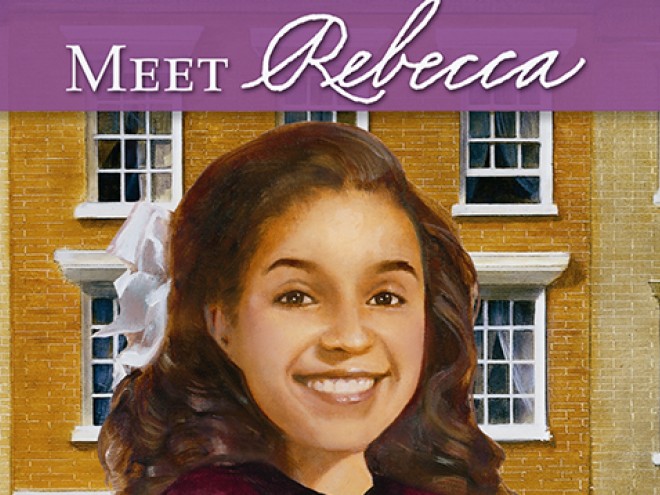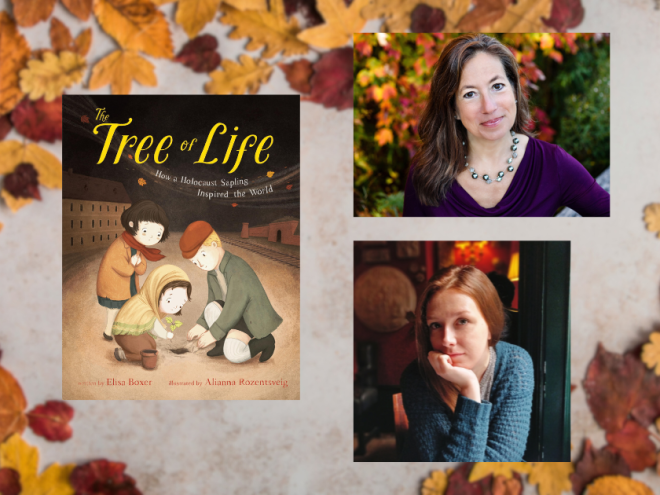
Debbie Levy’s distinctive place in children’s literature has been secure for some time. Her 2017 picture book I Dissent: Ruth Bader Ginsburg Makes Her Mark won both the Sydney Taylor Award and a National Jewish Book Award. Levy collaborated with artist Vanessa Brantley-Newton on We Shall Overcome: The Story of a Song. She’s written a handful of books coming out in 2019, on topics ranging from school de-segregation to Ladino music, and a graphic biography of RBG.
I recently asked Debbie some questions about her writing process, her vision, and her Jewish identity. Her answers help explain the appeal of her books and their lasting impact on readers.
Emily Schneider: You’ve written two books for young readers about Ruth Bader Ginsburg — the award-winning I Dissent and the forthcoming Becoming RBG: Ruth Bader Ginsburg’s Journey to Justice. Bader Ginsburg is an icon — to women, to Jewish Americans, and to people with progressive values. How did you approach the process of telling her life story for young readers?
Debbie Levy: When I set out to write the picture book biography, I knew that Ruth Bader Ginsburg was the second woman to serve on the Supreme Court of the United States and the first Jewish woman on the Court. I knew that, before she was a Supreme Court justice, she was a federal appeals court judge in Washington, D.C., and, before that, a leading lawyer in the field of equal rights for women and girls.
What I didn’t know, until I started researching more deeply, is that she has been disagreeing with unfairness and with things that are just plain wrong from the time she was a little girl. I mean, in elementary school, left-handed little “Kiki” Bader objected to being required to write with her right hand. She questioned girls’ exclusion from shop class. Later, of course, she went on to disagree, resist, object, and dissent her way into big things.
So, I realized, the story of her life offers this inspiring lesson: Disagreeing does not make you disagreeable, and important change happens one disagreement at a time. And I thought: What fine ideas for a children’s book!
For the forthcoming graphic novel-style biography, Becoming RBG, I have the space (two-hundred pages) and the older readership to bring an additional theme into focus, one inspired by something RBG has said many times: “Real change, enduring change, happens one step at a time.” Young Ruth “Kiki” Bader wasn’t born a firebrand feminist. She didn’t learn the hard lessons of injustice and inequality in a day. Rather, step by step she evolved; step by step she became Ruth Bader Ginsburg, “flaming feminist litigator” — her words! — who has created enduring change.
And so Becoming RBG tells the story of Ruth Bader Ginsburg’s evolution, from childhood through young adulthood, from law student to professor to litigator to federal judge — and finally to the Supreme Court. I hope to show readers that becoming a changemaker is something a young person can grow into. Through RBG’s story, readers will see that looking outside oneself can make all the difference between being a bystander and being a pathbreaker.
ES: Your book The Year of Goodbyes: A True Story of Friendship, Family, and Farewells, a moving account of your mother’s escape from Nazi Germany, and the forthcoming This Promise of Change: One Girl’s Story in the Fight for School Equality, are both written in verse. This format seems to be increasingly popular in children’s books — see the works of Jacqueline Woodson, Kwame Alexander, and Karen Hesse, for example. Given that poetry is sometimes considered to be difficult or inaccessible, what is the appeal of a story in verse to today’s young readers?
DL: To quote a hero of mine, I dissent from the notion that poetry has to be difficult or inaccessible! In some ways, I think it can be more accessible than straight prose, because poetry is compact (plenty of white space on the page), without wasted words, and its language is vivid. It can make you laugh out loud. It can make you cry. Sure, it can be esoteric, but it doesn’t have to be. Consider the three authors you mention; their novels in verse hook readers from the first page.
In The Year of Goodbyes, I used entries from my mother’s childhood poesiealbum—that’s translated as “poetry album,” and it’s like an autograph album or friendship book — as the stepping stones through her last year in Germany in 1938. Writing the narrative in free verse seemed to flow naturally from and honor the poesiealbum. Also, although people don’t walk around talking and thinking in poetry, I do think that free verse is good at capturing something essential about the way we think and react, especially under stressful conditions — and so the format conveys my mother’s experience faithfully.
This Promise of Change, written with Jo Ann Allen Boyce, tells the true story of Jo Ann’s experience in 1956, when she and eleven other African American students walked into an all-white high school in Clinton, Tennessee to desegregate it. This was a year before Little Rock. What went on in Clinton was front-page news all over the country — and yet it’s largely lost to history today. Jo Ann was a very musical girl and loved poetry, so presenting her story in verse (free verse and also some structured forms) reflects her character. Also, this is an emotional story, and we think — we hope — the emotion is served well by the verse format.
ES: How has your Jewish identity framed your work?
DL: Being Jewish is inextricably part of who I am. I am not particularly religious or observant but I was born a Jew — my identity is Jewish; my culture and my thoughts and my baked goods are Jewish. Who I am cannot help but show up in my books, whether they are on Jewish or non-Jewish themes. I do have this yearning for Jews to remind ourselves, and those who are looking at us, that Judaism stands for, and is about, ethics above all, and that (in my view) being Jewish is about treating people fairly and standing up for justice. Also, as Jews, we look up to those who seek knowledge, who value facts, and who put knowledge and facts in service of humanity — in a mensch-like way.
When it comes to books specifically with Jewish themes, of course my particular Jewish identity shapes the subjects that call to me. I do have two “Jewish books” coming out in 2019, in addition to the two we’ve mentioned so far. One is The Key From Spain: Flory Jagoda and Her Music, about a woman who is known as the “keeper of the flame” of Ladino and Sephardic music, and whose life experience illuminates the possibility of cross-cultural understanding and acceptance. The other is Yiddish Saves the Day!, an utterly silly story about a day gone wrong, but then made right, thanks to the lively words of Yiddish. Let’s not forget that other hallmark of Judaism: humor. We die without it.
ES: This Promise of Change, like your previous book, We Shall Overcome, presents aspects of the civil rights movement for a young audience. How did your Jewish identity fit into your vision for both of these books?
DL: I seem to return in my books to the theme of the Other or Outsider; surely this has roots in my Jewish identity, for Jews have been and still are so often the Other, the Outsider. But also, for me, Jewish identity is tied to the thirst and quest for justice, and so it is seamlessly tied to the themes of We Shall Overcome and This Promise.
ES: How do you see the role of Jewish authors within the #WeNeedDiverseBooks movement?
DL: Jewish authors can write books that serve as mirrors of, and windows onto, Jews and the Jewish experience, just as authors of other diverse backgrounds can do the same with respect to their own communities. So Jewish kids can see themselves mirrored in different situations in books where Judaism may be front and center or may be simply a causal characteristic; and non-Jewish readers can look through the window into the varied experiences of Jews and Jewishness.
Or Jewish authors can write books that aren’t mirrors of, or windows onto, the Jewish experience. They can just write books about the subjects, themes, people, places, and ideas that call to them. This is also diversity. I don’t want any group to feel constrained to write an expected book, and I don’t want readers to think of authors as categories. Each writer is an individual — each reader, too.
Emily Schneider writes about literature, feminism, and culture for Tablet, The Forward, The Horn Book, and other publications, and writes about children’s books on her blog. She has a Ph.D. in Romance Languages and Literatures.



